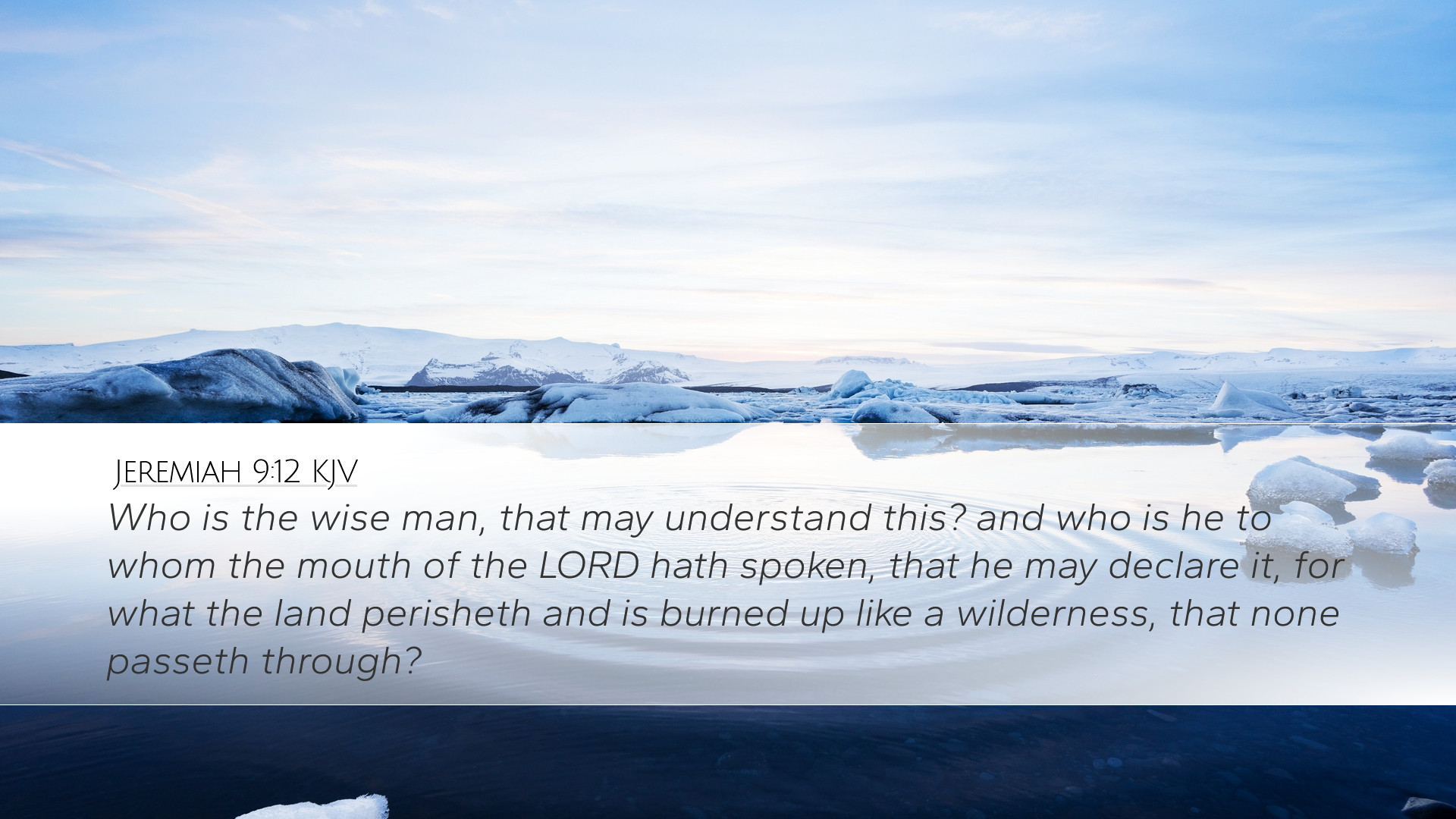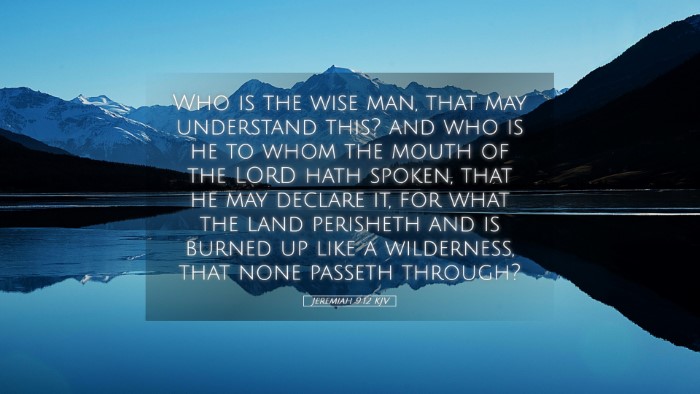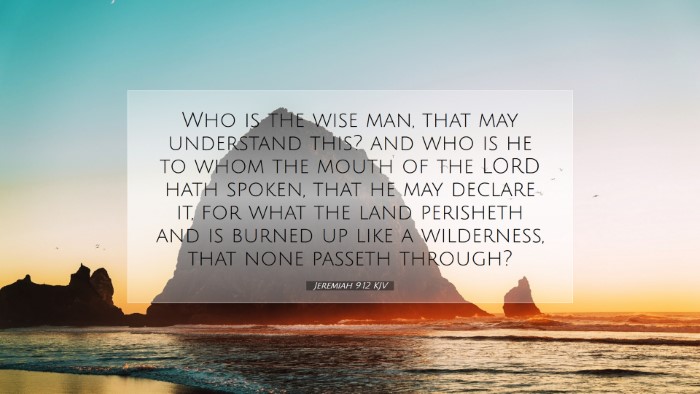Commentary on Jeremiah 9:12
Verse: Jeremiah 9:12 - "Who is the wise man, that may understand this? And who is he to whom the mouth of the Lord hath spoken, that he may declare it? why is the land perished and burned up like a wilderness, that none passeth through?"
Introduction
This verse presents a profound inquiry into the state of the land and the people of Israel. Jeremiah's lament reflects the desolation brought upon Judah due to their sins and the judgment of God. It poses critical questions that invite deep reflection and understanding.
Analysis of the Text
The verse serves as a sorrowful cry of the prophet. It heightens spiritual urgency and invites both introspection and communal reflection. Through the lens of varying commentaries, we will explore the implications of this verse.
Insights from Public Domain Commentaries
1. Matthew Henry's Commentary
Matthew Henry emphasizes the gravity of wisdom in understanding God’s ways. He notes that the wise man should possess the ability to comprehend the moral and spiritual decay of the land. He elucidates that true wisdom comes from acknowledging God’s voice and recognizing the causes of desolation.
- Historical Context: Henry provides a backdrop of the disastrous conditions prevalent in Judah, linking the nation’s failures to its abandonment of divine laws.
- Call for Understanding: He argues that it is not merely academic knowledge that is sought, but a heartfelt comprehension of the covenant and its repercussions when violated.
- Divine Communication: The prophet poses questions directed towards those who have the spiritual acumen to discern God’s messages; it signifies a yearning for prophetic and godly wisdom.
2. Albert Barnes' Notes on the Bible
Albert Barnes remarks on the rhetorical questions presented in this verse. He underscores that Jeremiah seeks those who can interpret the state of the land through the lens of divine truth.
- Nature of Wisdom: Barnes asserts that wisdom is not just knowledge but the application of that knowledge to life’s situations. He stresses that those with true understanding are able to see the link between faithfulness to God and the health of the land.
- The State of the Land: The image of the land being “perished and burned up like a wilderness” symbolizes the destruction brought forth by sin and indifference to God’s covenant.
- Call to Action: Barnes urges contemporary readers to consider how they might respond to similar spiritual and moral crises in their own contexts.
3. Adam Clarke's Commentary
Adam Clarke's interpretation adds depth to the understanding of divine sovereignty and human responsibility. He notes that the questioning found in this verse ultimately leads to reflection upon the consequences of a nation’s sin.
- Rhetorical Intent: Clarke highlights that Jeremiah is not just seeking an intellectual pursuit but is prompting a discourse on the larger implications of disobedience towards God.
- Spiritual Desolation: He elaborates on the metaphoric portrayal of the land and connects it to the spiritual condition of the people, suggesting that spiritual faithlessness results in social and physical degradation.
- Hope amidst Judgment: Despite the somber assessment, Clarke also encourages readers to seek after God’s mercy, suggesting that understanding the state of the land should lead to repentance rather than despair.
Theological Considerations
This verse raises critical theological questions about the nature of wisdom, the fidelity of God’s people, and the inherent relationship between sin and its consequences. It challenges readers to consider their personal and communal spiritual health and the broader implications of their collective faithfulness.
The Issue of Divine Judgment
Divine judgment is a theme that permeates the book of Jeremiah. The understanding that unfaithfulness to God leads to dire consequences resonates throughout the prophetic writings. This verse acts as a reminder of the seriousness of sin and the resulting separation from God’s blessings.
Wisdom and Understanding
In seeking wisdom, believers are called to look beyond worldly knowledge and to pursue a deeper understanding of God’s ways. As reflected in the commentaries, true wisdom involves responsiveness to God’s instruction and a commitment to live in accordance with His will.
Practical Application
For pastors, theologians, and students of Scripture, Jeremiah 9:12 encourages self-examination and a call to corporate responsibility.
- Self-Reflection: How are we, as individuals and communities of faith, responding to God’s calling? What does our spiritual landscape reveal about our relationship with God?
- Challenges to Wisdom: Recognizing contemporary issues, it prompts reflection on modern societal decay and our role therein as agents of change.
- Encouragement of Prayer and Repentance: This verse serves as a clarion call to seek God in prayer, calling for repentance both personally and collectively as the Church.
Conclusion
Jeremiah 9:12 confronts its readers with profound questions regarding wisdom, understanding, and the condition of their spiritual lives. Through the insights derived from prominent biblical scholars, one can appreciate the weight of this verse not only in its historical context but also in its relevance to today’s believers. It invites a journey of discernment towards recognizing God’s voice amidst the chaos of life, ultimately paving the way for restoration and revival.


